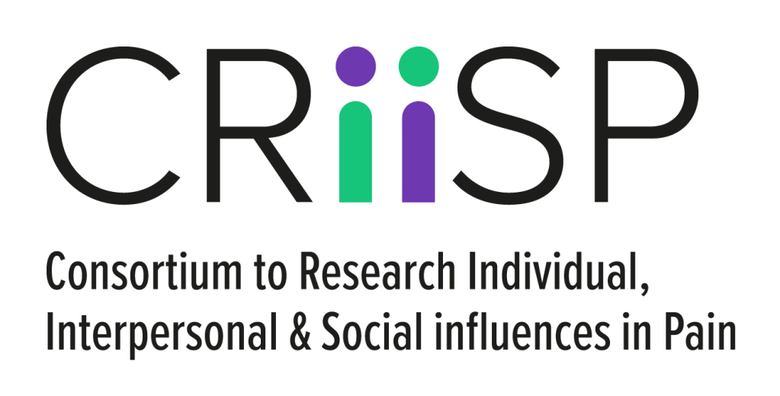
Duration: 1 July 2021 to 30 June 2025
Funder: Medical Research Council and Versus Arthritis as part of the APDP initiative.
Chief investigator: Professor Edmund Keogh (University of Bath)
UoA co-investigators: Dr Elaine Wainwright
Research fellow: Dr Cara Ghiglieri
This research comprises one workpackage of the wider work of the consortium. For further details about CRIISP, please click here.
In this work, we seek to understand how people living with chronic pain experience everyday life and how societal aspects of our lives impact on the pain experience, and vice versa. Social aspects include factors such as socioeconomic position, occupation or lifestyle, and our work also references other sociodemographic factors such as age, sex/gender and ethnicity.
In this work we are conducting qualitative and quantitative reviews of relevant literature. We will then undertake further quantitative and qualitative work to test and explore which social factors are the most important in the onset/transitions of pain. We will be working with public contributors throughout this research.
CRIISP is part of the Advanced Pain Discovery Platform (APDP).
If you have any queries about the study, you can contact the study team via email at epidemiology@abdn.ac.uk

- Background and aims
-
Psychological factors, such as thoughts and feelings; and social factors, including personal relationships and lifestyle can affect chronic pain alongside biological factors. We don’t fully know which of these are most important, or how they combine to affect people’s experience of pain.
To find out what is important, this project will focus on how people think and feel about pain and how relationships with others affect their pain, while considering wider social and environmental influences on pain.
- What will this research involve?
-
Sitting within the wider work of CRIISP, this research will involve three stages:
Literature reviews
We are conducting qualitative and quantitative reviews of relevant literature, in conjunction with our patient and public contributors.
The findings from these reviews (alongside advice from the study’s PPI partners) will tell us what social factors are most important in the onset/transitions of pain.
Quantitative work
We will consider what existing study cohorts, such as the Avon Longitudinal Study of Parents and Children (ALSPAC) and the Health Aging After Fifty (HEAF) study, are already asking with regards to the important social factors identified in our literature reviews, and how these are considered alongside measures of pain. Where these factors are not already being assessed, we will consider whether and how these can be added into future data collection.
We will also use these existing cohorts to test working hypotheses, such as whether important social factors can predict future pain onset and/or transitions, such as what makes pain start or stop, get better or get worse.
Working with our public and patient partners is key, for example, where we are embedding new measures into ALSPAC. Our partners will provide feedback on proposed measures, and the ALSPAC cohort advisory panel will also have the chance to provide feedback.
Ethnography
We are currently planning in-depth ethnographic work to explore the relationship between social factors and the pain experience, such as how, and in which ways, social relations and physical environments might impact pain and the ways in which these environments might be influenced. To do this we will observe people regularly in the context of their daily lives. We may also conduct one to one interviews with some of these people if appropriate.
Working with our public and patient partners at this stage is key as they will provide steering insight such as providing advice on study design, help to co-create interview schedules and/or observations plans and discuss acceptability of these plans for research participants
- Study team
-
Chief investigator
-
Professor Edmund Keogh (University of Bath)
Workpackage co-investigators, research fellows and partners
- Professor Rachael Gooberman-Hill (University of Bristol) - Workpackage lead
- Dr Elaine Wainwright (University of Aberdeen) - Workpackage co-lead
- Mr Emilio Costales (Royal Holloway University of London)
- Dr Amber Guest (University of Aberdeen)
- Professor Rebecca Pearson (Manchester Metropolitan University / University of Bristol)
- Dr Hannah Sallis (University of Bristol)
- Dr Samantha Stone (University of Bristol)
- Dr Anica Zeyen (Royal Holloway University of London / University of Bristol)
Workpackage co-ordinator
- Mr Rupert Warne
You can find details of the wider CRIISP team here.
-
- Who has funded this study?
-
This work part of CRIISP, which is funded by UKRI and Versus Arthritis through the APDP initiative.
For UKRI, the initiative is led by the Medical Research Council (MRC), with support from the Biotechnology and Biological Sciences Research Council (BBSRC) and Economic and Social Research Council (ESRC).
- Contact
-
For further details, please see details on the main CRIISP website.
